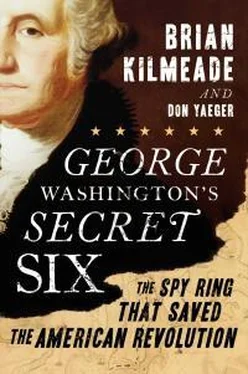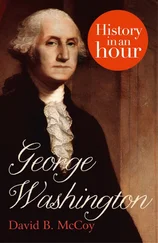The general and the major discussed the best approach to the assignment of names—at once specific enough to be clearly and instantly identifiable to the intended recipient, yet not so unusual as to obviously be a fake name nor so common that an innocent individual who happened to bear the same name might be hunted down by the enemy. Thus, Tallmadge was dubbed “John Bolton,” a mild and unassuming moniker with a surname that was among the oldest in the colonies. The genesis of Woodhull’s name was a little more creative. Charles Scott’s initials were inverted as a nod to his position as chief spymaster for the Continental Army, and Tallmadge selected “Samuel” for a first name, probably in honor of his younger brother, Samuel Tallmadge, who had done some courier work for Patriot efforts on Long Island. The last name, it has been suggested, became an adaptation of “Culpeper,” the county in Virginia that bordered the western edge of Washington’s boyhood home of Stafford County, and the region in which he did some of his early work as a surveyor. Thus, “Samuel Culper” was born.
Pseudonyms were in place. Courier routes were set. Specifics as to the type of information Washington sought were established. The groundwork was laid for the ring to begin its work. The first two cogs, Tallmadge and Woodhull, were in place to begin turning the wheel that would steadily roll out the defeat of the British in New York. They would not disappear into their new identities and leave their old lives behind. Instead, their spy names would serve as their passports into a double life—Tallmadge as an intelligence officer with a closely guarded secret and a covert post in Connecticut where he would retrieve the latest news, and Woodhull as a man who must go unnoticed in the den while seeking ways to overthrow the lions.
CHAPTER 5 The Ring Springs into Action
Woodhull had his sights set on Caleb Brewster as a fellow spy from the beginning. He had to admire the audacity of the brash longshoreman who was a bull of a man—physically huge and imposing—and was using his intimidating size and tremendous athletic skill to make himself a regular nuisance to the British. Ever the daredevil, he taunted them from his whaler laden with smuggled goods and then amazingly evaded capture. Just as Woodhull knew the landscape, Brewster knew the coves and the waterways, slipping out of reach of the British by ducking into one or another until the patrol gave up trying to catch him red-handed.
But that had always been Brewster’s way. Back in June 1775, some local men had circulated a document declaring their determination to fight British oppression, swearing that they would never “become slaves.” Despite his usual caution, Woodhull had signed it, as had one of Benjamin Tallmadge’s brothers. So, too, had Caleb Brewster. Remembering Brewster’s signature and observing the man’s high spirits and taste for adventure, Woodhull knew that Brewster would be an easy convert to the mission.
What Woodhull did not know was that Brewster had already embraced the thrill of espionage. The young man had been in correspondence with General Washington since July 1778—several weeks before Tallmadge had recruited Woodhull to manage the ring—reporting on the state of the British warships in New York Harbor, as well as troop movements and naval preparations around Long Island. His reports revealed little new information and were somewhat out-of-date by the time they reached Washington, but the gesture proved to the commander in chief that there were Patriots ready and willing to spy and that a well-organized ring of secret agents could yield real intelligence.
While taking care not to be overheard, Woodhull was probably rather direct in his proposal to Brewster. The man’s vigor and fearlessness in openly defying the British navy on the Sound left little doubt about which way his sentiments lay. Already hooked on the adrenaline rush of espionage, Brewster was an easy sell. He enthusiastically agreed to ferry messages to Connecticut and even offered to add his own observations to the reports headed to Tallmadge.
Woodhull supposed that his old friend Austin Roe, however, might prove somewhat more difficult to recruit. Roe was friends with Brewster, and while he was jovial and spirited as well, Roe was also comfortably situated, married, firmly established in his business, and took no joy in evading arrest in a rowboat for sport. But unlike Woodhull, who could find ready buyers for his produce in the city even if he alienated his Loyalist neighbors, or Brewster, who could find work as a longshoreman at any dock that needed the hands, Roe was a tavern keeper. His livelihood was entirely dependent upon the loyal patronage of local folks and the occasional traveler who passed his way and needed a room for the night. Should the spies’ work be discovered, they could all expect something far worse than a loss of employment. But suspicions have a way of becoming whispers in small towns, and rumors about Roe’s activities could hurt his business even after the war.
Despite initial concerns, Roe was pleased by the mission and eager to offer his service in any way he could. Now a team of three, Woodhull, Brewster, and Roe devised a plan by which their intelligence would make its way across land and water to reach General Washington. Woodhull would operate from Amos Underhill’s boardinghouse in Manhattan, a location unlikely to arouse suspicion because of Woodhull’s family connection and because he already made fairly regular visits. The information he gathered would leave the city in one of two ways. Either Roe would make the trip into the city on the pretense of purchasing provisions for his business, or else Woodhull himself would travel back to Setauket, where he would leave the papers at Roe’s tavern or a predetermined location in a field near Roe’s house so the two men would not be seen together. This “dead-drop” method was less likely to raise suspicions but presented a much higher risk of a stranger’s stumbling upon the papers before they had been picked up, so the men rarely employed it. The two families were known to be old friends—Roe’s father had purchased the building he used for his home and business from the Woodhulls back in 1759—so nothing would seem out of place even if the two men were to be seen together carrying letters for the folks at home or visiting in the city. But Roe and Woodhull took care to ensure that the patterns of their meetings would not become too predictable and seem shady to nosy locals or eagle-eyed British soldiers.
Caleb Brewster, whose family lived just yards away from Roe, would wait for an opportunity to retrieve the papers from Roe. He would then dash across the water when the British navy had their backs turned. On the Connecticut side of the Sound, Tallmadge would be waiting for Brewster to dock and pass off the letters, which Tallmadge would then hand-deliver to the general.
The whole process took approximately two weeks from beginning to end and offered several advantages over the more traditional method of a solitary spy slipping in to gather intelligence and then slipping back out again. Local men were less likely to raise suspicions than an outsider who suddenly appeared in the town, skulked about for a few days, and then disappeared again. Using existing routines also allowed for a longer-term observance that could note changes in patterns and procedures of the troops. And, of course, if one man attracted suspicion, the seemingly convoluted method of passing off information from one member to another would make it much more difficult for the enemy to intercept sensitive documents. The intervening step of entrusting the papers to Roe was a brilliant one. It minimized the connection between Woodhull’s frequent trips to and extended stays in the city and Brewster’s regular dashes across the water and allowed the men to avoid apparent contact. But the proximity of Brewster’s home to Roe’s made their familiarity far more natural.
Читать дальше












